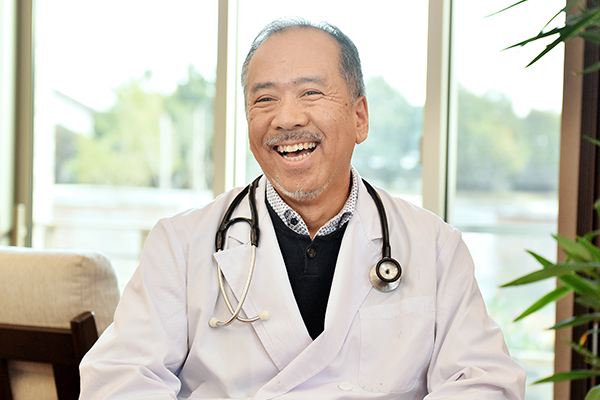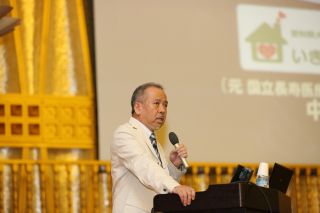2018 Academic Year: Assembly Lecture 2 (May 7th)
| 2018 Academic Year: Assembly Lecture 2 (May 7th) | The Origin of Medicine: From the frontline of home-based hospice care – witnessing life and death Dr. Kazumitsu Nakashima |

Ikiiki zaitaku Clinic
Dr. Kazumitsu Nakashima
Biography
1985: Graduated from the Faculty of Medicine, Nagoya University, trained at Nagoya Ekisaikai Hospital. Gained additional experience at various hospitals and corporate clinics following this.
1998: Studied at Baylor College of Medicine in Texas, USA.
2000: Took up a post at the National Center for Geriatrics and Gerontology.
2012: Left the center with the motive of promoting home-based medical care services, studying home-based hospice care at the “Megumi Home Care Clinic” in Yokohama and the “Medical Incorporated Association Pallium, Clinic Kawagoe” in Tokyo.
2014: Established the “Iki-iki (lively) Home Care Clinic” in Obu, Aichi, providing home-based medical care services mainly in the locations of Obu City, Tokai City, Chita City, and Higashiura Town.
Specialties: Respiratory diseases of the elderly / terminal care / home-based hospice care
Affiliated academic societies: The Japanese Society of Internal Medicine (board-certified member, former board-certified instructor) / the Japanese Respiratory Society (board-certified member, senior fellow) / the Japan Geriatric Society / the Japanese Society for Palliative Medicine / the Japanese Association for Home-Based Care and Medicine, etc.
1985: Graduated from the Faculty of Medicine, Nagoya University, trained at Nagoya Ekisaikai Hospital. Gained additional experience at various hospitals and corporate clinics following this.
1998: Studied at Baylor College of Medicine in Texas, USA.
2000: Took up a post at the National Center for Geriatrics and Gerontology.
2012: Left the center with the motive of promoting home-based medical care services, studying home-based hospice care at the “Megumi Home Care Clinic” in Yokohama and the “Medical Incorporated Association Pallium, Clinic Kawagoe” in Tokyo.
2014: Established the “Iki-iki (lively) Home Care Clinic” in Obu, Aichi, providing home-based medical care services mainly in the locations of Obu City, Tokai City, Chita City, and Higashiura Town.
Specialties: Respiratory diseases of the elderly / terminal care / home-based hospice care
Affiliated academic societies: The Japanese Society of Internal Medicine (board-certified member, former board-certified instructor) / the Japanese Respiratory Society (board-certified member, senior fellow) / the Japan Geriatric Society / the Japanese Society for Palliative Medicine / the Japanese Association for Home-Based Care and Medicine, etc.

The content of the lecture
Dr. Nakashima, as a home-based care physician who also practices home-based terminal care, delivered a lecture entitled “the Origin of Medicine.” He spoke about the interprofessional collaboration between pharmacists, care managers, nursing-care helpers, and the government, as being one of the key factors to successful home-based medical care. Thus, understanding each other and cooperating with each other is very important.
Dr. Nakashima, as a home-based care physician who also practices home-based terminal care, delivered a lecture entitled “the Origin of Medicine.” He spoke about the interprofessional collaboration between pharmacists, care managers, nursing-care helpers, and the government, as being one of the key factors to successful home-based medical care. Thus, understanding each other and cooperating with each other is very important.
| Feedback from a student Freshman, Faculty of Medical Technology, School of Medical Sciences What I gained from this lecture This lecture inspired me to become a member of a medical team that can respect a patient’s will and make decisions that reflect this will as much as possible. I also learnt that what a patient thinks is best for him/her does not necessarily coincide with what his/her family members think is best for the patient. I gained an understanding and appreciation that those involved in home-based medical care always keep in mind “What is best for the happiness of the patient?” and try to make possible what cannot be done at hospitals. I also began to ponder the ideal future roles of hospitals and home-based care. What impressed me the most I developed an understanding that we must build interprofessional collaborative relationships that can meet a patient’s wishes as much as possible, by establishing good communication among multiple healthcare professionals that deal with a particular patient. I also gained an appreciation that hospices often can do what hospitals cannot. In considering the ideal style of medical care in the future, I felt that deeper cooperation between hospitals and hospices will be necessary. Above all, I have come to realize that treatment itself is not everything. |

